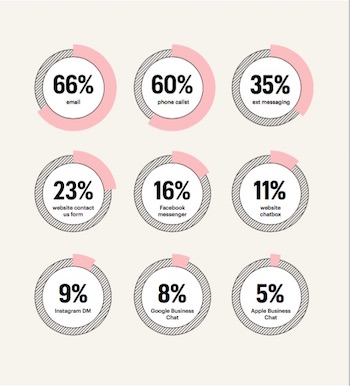Sales Strategy
Text Or Email? There’s A Big Disconnect In Business August 05, 2020 (0 comments)

New York, NY—Customers prefer to engage with a business through texting or another messaging app. But businesses wrongly still believe customers prefer email and phone calls to text messaging. Image: The State of Business Texting, by Podium.
This is one of the key findings from a new study, The State Of Business Texting, conducted by Podium.
“We know that the open rate for email hovers around 20% and the open rate for text messages is an incredible 98%. It’s clear that texting is the preference of the consumer, says the report. Businesses, meanwhile, still think consumers' first preference is email--a tremendous disconnect.
“We know, from outside research, that convenience is an expectation for customers in today’s world. Nearly 80% of U.S. consumers say that convenience is one of the most important elements of a positive customer experience.And marketers are keyed into that fact. Four out of five marketers report that customers want to pick the communication method that works best for them. And communicating outside of business hours is just as important,” continues the report.

What businesses surveyed by Podium said customers want in communication. But although 2/3 of respondents thought their customers prefer emails, the reality is that open rates are 78% higher for a text.
Text messaging is growing in importance because customers prefer it to speaking by phone. This is true across all business sizes, whether small (like jewelers), mid-size or large enterprises. Among the businesses that already use text messaging as a communication channel for prospects and customers, half use their phone or tablet to send messages to customers while a growing number use a text-messaging platform. Enterprise and mid-market businesses are more likely than small businesses to use a text messaging software platform.
Speedy response time is important to customers, something that nearly 100% of marketers surveyed agreed. And consumers still prefer real people to bots or an automated menu when they have to make a phone call. (Editor’s note: Luckily, most small businesses like jewelry stores typically are not using automated phone trees, though many stores do have an automated voice mail that requires entering a name or extension.)

Customers want a fast response and don't want to deal with bots or automated phone trees.
Offering a way to directly text from a website is important; something that is available through Google, but you will find that people are hitting up your chat function in the middle of the night.
There are ways to manage a barrage of 3 a.m. texts or chat requests without losing sleep. It’s essential to set boundaries unless you truly don’t care about sleeping. An automated response can give an immediate answer, even if it’s “hey, we’re sleeping now but we’ll get back to you first thing in the morning!”
Click here to see what a panel of Millennial jewelers have to say about business texting. For example, texting is necessary, but so is managing it, said Alexis Padis of Padis Jewelry in San Francisco, one of the panelists.
“It’s a challenge because I don’t want staff on their phones all the time, and second, if they ever leave they take that client contact with them.” The jeweler provides staff with store-owned phones for work use, and requires all texts to clients be done on that phone.
Click here to download the full Podium e-book, The State of Business Texting.






